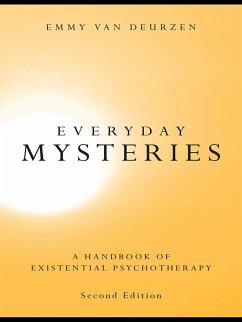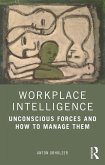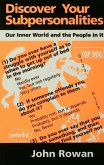41,95 €
41,95 €
inkl. MwSt.
Sofort per Download lieferbar

21 °P sammeln
41,95 €
Als Download kaufen

41,95 €
inkl. MwSt.
Sofort per Download lieferbar

21 °P sammeln
Jetzt verschenken
Alle Infos zum eBook verschenken
41,95 €
inkl. MwSt.
Sofort per Download lieferbar
Alle Infos zum eBook verschenken

21 °P sammeln
- Format: ePub
- Merkliste
- Auf die Merkliste
- Bewerten Bewerten
- Teilen
- Produkt teilen
- Produkterinnerung
- Produkterinnerung

Bitte loggen Sie sich zunächst in Ihr Kundenkonto ein oder registrieren Sie sich bei
bücher.de, um das eBook-Abo tolino select nutzen zu können.
Hier können Sie sich einloggen
Hier können Sie sich einloggen
Sie sind bereits eingeloggt. Klicken Sie auf 2. tolino select Abo, um fortzufahren.

Bitte loggen Sie sich zunächst in Ihr Kundenkonto ein oder registrieren Sie sich bei bücher.de, um das eBook-Abo tolino select nutzen zu können.
This book provides an in-depth introduction to existential psychotherapy and offers a fresh perspective for anyone training in psychotherapy, counselling and psychoanalysis.
- Geräte: eReader
- mit Kopierschutz
- eBook Hilfe
- Größe: 1.2MB
Andere Kunden interessierten sich auch für
![Everyday Mysteries (eBook, PDF) Everyday Mysteries (eBook, PDF)]() Emmy Van DeurzenEveryday Mysteries (eBook, PDF)40,95 €
Emmy Van DeurzenEveryday Mysteries (eBook, PDF)40,95 €![Re-Visioning Existential Therapy (eBook, ePUB) Re-Visioning Existential Therapy (eBook, ePUB)]() Re-Visioning Existential Therapy (eBook, ePUB)33,95 €
Re-Visioning Existential Therapy (eBook, ePUB)33,95 €![Existential Therapy (eBook, ePUB) Existential Therapy (eBook, ePUB)]() Claire Arnold-BakerExistential Therapy (eBook, ePUB)20,95 €
Claire Arnold-BakerExistential Therapy (eBook, ePUB)20,95 €![Workplace Intelligence (eBook, ePUB) Workplace Intelligence (eBook, ePUB)]() Anton ObholzerWorkplace Intelligence (eBook, ePUB)29,95 €
Anton ObholzerWorkplace Intelligence (eBook, ePUB)29,95 €![Discover Your Subpersonalities (eBook, ePUB) Discover Your Subpersonalities (eBook, ePUB)]() John RowanDiscover Your Subpersonalities (eBook, ePUB)37,95 €
John RowanDiscover Your Subpersonalities (eBook, ePUB)37,95 €![The Myth of the Untroubled Therapist (eBook, ePUB) The Myth of the Untroubled Therapist (eBook, ePUB)]() Marie AdamsThe Myth of the Untroubled Therapist (eBook, ePUB)28,95 €
Marie AdamsThe Myth of the Untroubled Therapist (eBook, ePUB)28,95 €![Psychologically Informed Mediation (eBook, ePUB) Psychologically Informed Mediation (eBook, ePUB)]() Monica HanawayPsychologically Informed Mediation (eBook, ePUB)26,95 €
Monica HanawayPsychologically Informed Mediation (eBook, ePUB)26,95 €-
-
-
This book provides an in-depth introduction to existential psychotherapy and offers a fresh perspective for anyone training in psychotherapy, counselling and psychoanalysis.
Dieser Download kann aus rechtlichen Gründen nur mit Rechnungsadresse in A, B, BG, CY, CZ, D, DK, EW, E, FIN, F, GR, HR, H, IRL, I, LT, L, LR, M, NL, PL, P, R, S, SLO, SK ausgeliefert werden.
Produktdetails
- Produktdetails
- Verlag: Taylor & Francis eBooks
- Seitenzahl: 384
- Erscheinungstermin: 16. Dezember 2009
- Englisch
- ISBN-13: 9781135240462
- Artikelnr.: 42977927
- Verlag: Taylor & Francis eBooks
- Seitenzahl: 384
- Erscheinungstermin: 16. Dezember 2009
- Englisch
- ISBN-13: 9781135240462
- Artikelnr.: 42977927
- Herstellerkennzeichnung Die Herstellerinformationen sind derzeit nicht verfügbar.
Emmy van Deurzen is an existential psychotherapist, counselling psychologist and philosopher, who has published numerous books and who lectures internationally on a broad range of existential topics. She was the founder of Regent's College School of Psychotherapy and Counselling, of the Society for Existential Analysis and of the New School of Psychotherapy and Counselling in London, which she continues to direct. Her private practice, Dilemma Consultancy Ltd. is based in Sheffield and London.
Preliminary Remarks. Preface. General Introduction. Part I: Theory:
Philosophical Underpinnings. Sören Kierkegaard: A Very Individual Approach.
Friedrich Nietzsche: With Passion and Intensity. Edmund Husserl: Science of
a New Psychology. Karl Jaspers: The Way to Wisdom. Martin Heidegger:
Blueprint for Living. Martin Buber: Human Relations Reconsidered. Max
Scheler: The Human Heart and Inter-subjectivity. Jean-Paul Sartre: To Be or
Not to Be. Maurice Merleau Ponty: Embodied Living. Paul Tillich: A New
Spirituality. Other Philosophical Contributions. Female and Feminist
Contributions. Part II: Existential Dimensions: A Map of the World.
Worldviews, Paradoxes and Dialectics: A Copernican Revolution. The Physical
Dimension: Being with Nature. The Social Dimension: Being with Others. The
Personal Dimension: Being with Oneself. The Spiritual Dimension: Being with
Meaning. Part III: New Foundations for Psychotherapy. Introduction. Karl
Jaspers: Psychopathology. Eugene Minkowski: The Dimension of Time. Jacques
Lacan: The Role of Language. Ludwig Binswanger: The Beginning of
Existential Therapy. Medard Boss: Daseinsanalysis. Victor Frankl:
Logotherapy and the Search for Meaning. The American Contribution: May,
Bugental, Yalom and Others. Thomas Szasz: Social Dimension of Therapy.
Ronald Laing: Anti-Psychiatry. The British School of Existential Analysis.
Philosophical Consultancy. Part IV: Parameters of Existential
Psychotherapy. Objectives of the Approach. Ground Rules of Existential
Work. Consciousness and the Unknown. Therapeutic Dialogue. The Dynamic,
Multiple and Changing Self. Part V: Case Illustration. Rita's grief.
Conclusion.
Philosophical Underpinnings. Sören Kierkegaard: A Very Individual Approach.
Friedrich Nietzsche: With Passion and Intensity. Edmund Husserl: Science of
a New Psychology. Karl Jaspers: The Way to Wisdom. Martin Heidegger:
Blueprint for Living. Martin Buber: Human Relations Reconsidered. Max
Scheler: The Human Heart and Inter-subjectivity. Jean-Paul Sartre: To Be or
Not to Be. Maurice Merleau Ponty: Embodied Living. Paul Tillich: A New
Spirituality. Other Philosophical Contributions. Female and Feminist
Contributions. Part II: Existential Dimensions: A Map of the World.
Worldviews, Paradoxes and Dialectics: A Copernican Revolution. The Physical
Dimension: Being with Nature. The Social Dimension: Being with Others. The
Personal Dimension: Being with Oneself. The Spiritual Dimension: Being with
Meaning. Part III: New Foundations for Psychotherapy. Introduction. Karl
Jaspers: Psychopathology. Eugene Minkowski: The Dimension of Time. Jacques
Lacan: The Role of Language. Ludwig Binswanger: The Beginning of
Existential Therapy. Medard Boss: Daseinsanalysis. Victor Frankl:
Logotherapy and the Search for Meaning. The American Contribution: May,
Bugental, Yalom and Others. Thomas Szasz: Social Dimension of Therapy.
Ronald Laing: Anti-Psychiatry. The British School of Existential Analysis.
Philosophical Consultancy. Part IV: Parameters of Existential
Psychotherapy. Objectives of the Approach. Ground Rules of Existential
Work. Consciousness and the Unknown. Therapeutic Dialogue. The Dynamic,
Multiple and Changing Self. Part V: Case Illustration. Rita's grief.
Conclusion.
Preliminary Remarks. Preface. General Introduction. Part I: Theory:
Philosophical Underpinnings. Sören Kierkegaard: A Very Individual Approach.
Friedrich Nietzsche: With Passion and Intensity. Edmund Husserl: Science of
a New Psychology. Karl Jaspers: The Way to Wisdom. Martin Heidegger:
Blueprint for Living. Martin Buber: Human Relations Reconsidered. Max
Scheler: The Human Heart and Inter-subjectivity. Jean-Paul Sartre: To Be or
Not to Be. Maurice Merleau Ponty: Embodied Living. Paul Tillich: A New
Spirituality. Other Philosophical Contributions. Female and Feminist
Contributions. Part II: Existential Dimensions: A Map of the World.
Worldviews, Paradoxes and Dialectics: A Copernican Revolution. The Physical
Dimension: Being with Nature. The Social Dimension: Being with Others. The
Personal Dimension: Being with Oneself. The Spiritual Dimension: Being with
Meaning. Part III: New Foundations for Psychotherapy. Introduction. Karl
Jaspers: Psychopathology. Eugene Minkowski: The Dimension of Time. Jacques
Lacan: The Role of Language. Ludwig Binswanger: The Beginning of
Existential Therapy. Medard Boss: Daseinsanalysis. Victor Frankl:
Logotherapy and the Search for Meaning. The American Contribution: May,
Bugental, Yalom and Others. Thomas Szasz: Social Dimension of Therapy.
Ronald Laing: Anti-Psychiatry. The British School of Existential Analysis.
Philosophical Consultancy. Part IV: Parameters of Existential
Psychotherapy. Objectives of the Approach. Ground Rules of Existential
Work. Consciousness and the Unknown. Therapeutic Dialogue. The Dynamic,
Multiple and Changing Self. Part V: Case Illustration. Rita's grief.
Conclusion.
Philosophical Underpinnings. Sören Kierkegaard: A Very Individual Approach.
Friedrich Nietzsche: With Passion and Intensity. Edmund Husserl: Science of
a New Psychology. Karl Jaspers: The Way to Wisdom. Martin Heidegger:
Blueprint for Living. Martin Buber: Human Relations Reconsidered. Max
Scheler: The Human Heart and Inter-subjectivity. Jean-Paul Sartre: To Be or
Not to Be. Maurice Merleau Ponty: Embodied Living. Paul Tillich: A New
Spirituality. Other Philosophical Contributions. Female and Feminist
Contributions. Part II: Existential Dimensions: A Map of the World.
Worldviews, Paradoxes and Dialectics: A Copernican Revolution. The Physical
Dimension: Being with Nature. The Social Dimension: Being with Others. The
Personal Dimension: Being with Oneself. The Spiritual Dimension: Being with
Meaning. Part III: New Foundations for Psychotherapy. Introduction. Karl
Jaspers: Psychopathology. Eugene Minkowski: The Dimension of Time. Jacques
Lacan: The Role of Language. Ludwig Binswanger: The Beginning of
Existential Therapy. Medard Boss: Daseinsanalysis. Victor Frankl:
Logotherapy and the Search for Meaning. The American Contribution: May,
Bugental, Yalom and Others. Thomas Szasz: Social Dimension of Therapy.
Ronald Laing: Anti-Psychiatry. The British School of Existential Analysis.
Philosophical Consultancy. Part IV: Parameters of Existential
Psychotherapy. Objectives of the Approach. Ground Rules of Existential
Work. Consciousness and the Unknown. Therapeutic Dialogue. The Dynamic,
Multiple and Changing Self. Part V: Case Illustration. Rita's grief.
Conclusion.







